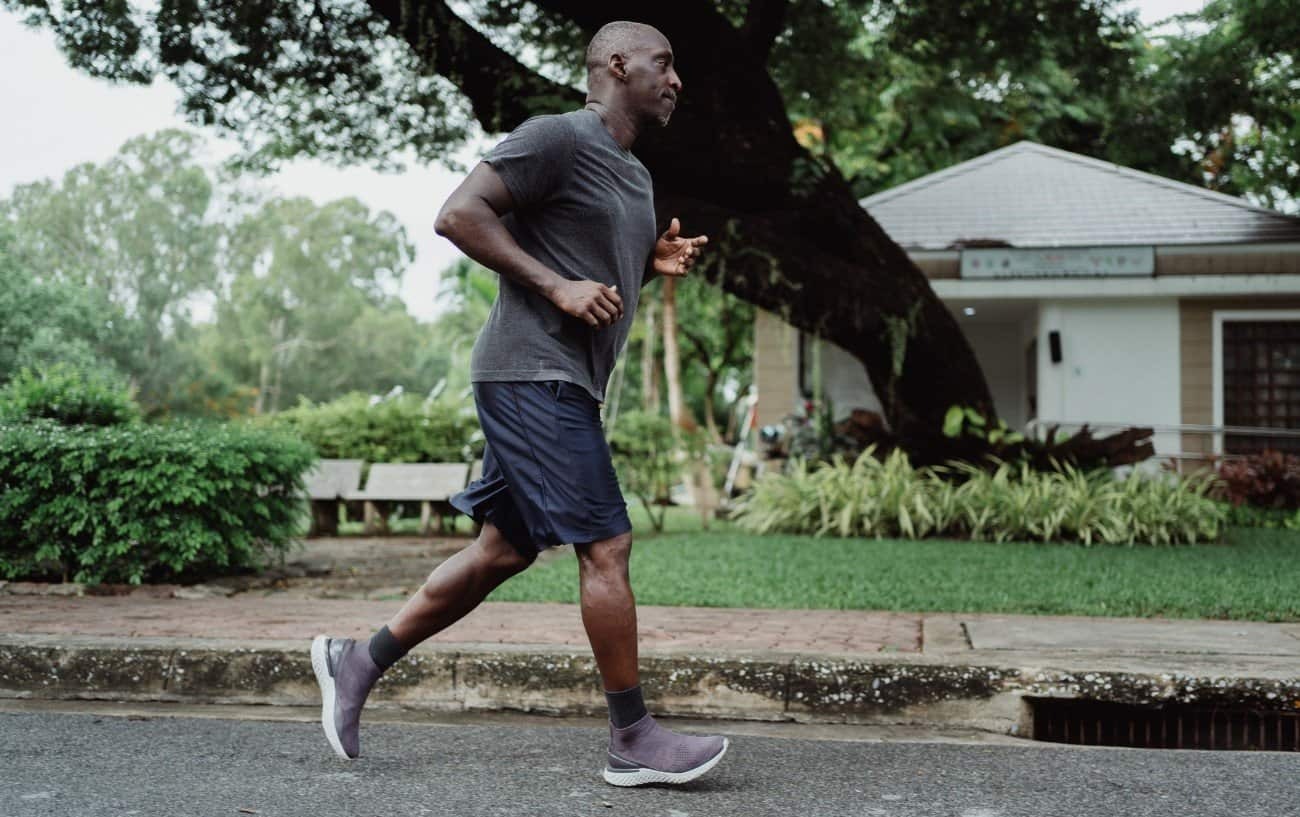

Featured
What To Do On First Ultramarathon
Modified: January 2, 2024
Discover what to do on your first ultramarathon with our featured guide. Get tips, advice, and training strategies to conquer this epic endurance challenge.
Introduction
Welcome to the world of ultramarathons! If you’re reading this article, it means you’re either considering participating in your first ultramarathon or you’ve already signed up and are seeking guidance on how to prepare for the challenge ahead. Either way, congratulations on taking the first step towards an incredible physical and mental achievement!
Ultramarathons are races that exceed the distance of a traditional marathon, usually ranging from 50 kilometers to 100 miles or more. These events test not just your physical endurance, but also your mental fortitude and sheer determination. Crossing the finish line of an ultramarathon is a transformative experience that pushes your boundaries, teaching you life lessons that extend far beyond the race course.
While the idea of running such a long distance may seem daunting, with proper preparation and a focused mindset, you can conquer this challenge. This article aims to provide you with valuable insights and practical tips to help you navigate your first ultramarathon and make it a memorable and successful experience.
Throughout this journey, it’s important to remember that completing an ultramarathon is about more than just finish times and rankings. It’s about embracing the adventure, relishing the camaraderie of fellow runners, and discovering your inner strength. So, let’s dive in and explore the essential steps you need to take to prepare for your first ultramarathon!
The Importance of Preparation
When it comes to embarking on your first ultramarathon, preparation is key. It’s not just about building physical endurance, but also about equipping yourself with the right mindset, knowledge, and tools to tackle the challenges that lie ahead.
One of the primary reasons preparation is crucial is to prevent injuries. Ultramarathons put immense strain on your body, and without adequate preparation, you may be more susceptible to overuse injuries or muscle fatigue. By gradually building up your mileage and incorporating cross-training exercises, you can strengthen your body and reduce the risk of injury.
Preparation also allows you to assess and address any weaknesses or imbalances you may have. Whether it’s improving your running technique, addressing muscle imbalances, or working on your core strength, targeted training can help you become a more efficient and resilient runner.
Furthermore, preparation is essential for mental conditioning. Ultramarathons test not just your physical abilities but also your mental resilience and determination. Develop a positive mindset and train your brain to push through fatigue, self-doubt, and moments of discomfort. Mental preparation will help you stay focused and motivated throughout the race.
- Educate yourself about the race: Familiarize yourself with the course terrain, elevation, and weather conditions, if possible. This knowledge will help you plan your training and gear accordingly.
- Establish a training plan: Work with a coach or create a training plan that gradually increases your mileage and includes long runs, speed work, and rest days. Consistency and gradual progression are key.
- Build a strong support system: Surround yourself with experienced runners, friends, or a running group who can offer advice, support, and encouragement during your training journey.
- Practice fueling and hydration: Experiment with different nutrition and hydration strategies during your long runs to determine what works best for you. This will play a crucial role in sustaining your energy levels during the race.
- Prepare your gear and equipment: Invest in quality gear and make sure you test it out during your training runs. It’s important to find comfortable shoes, proper clothing, and any other necessary equipment well in advance.
By taking the time to prepare adequately, you’ll not only enhance your chances of a successful race but also develop a deeper understanding of your own capabilities. Remember, an ultramarathon is not just about the destination, but also about the incredible journey along the way.
Training for an Ultramarathon
Training for an ultramarathon requires a structured and progressive approach that focuses on building endurance, strength, and mental resilience. Here are some key considerations to keep in mind as you train for your first ultramarathon:
Gradual progression: Begin by gradually increasing your mileage each week. Start with a comfortable distance and gradually build up over time. Avoid the temptation to push too hard too soon, as this can lead to overtraining and injuries.
Long runs: Incorporate long runs into your training regimen. These runs help you adapt to the demands of running for extended periods, both physically and mentally. Start with a distance that is challenging but attainable and gradually increase the duration as you progress.
Hill training: Ultramarathons often involve challenging terrain with varying elevations. Incorporate hill training into your workouts to build strength and endurance. This can involve running uphill, downhill, or a combination of both. Hill repeats and trail runs are great ways to simulate race conditions.
Strength and cross-training: Don’t neglect strength training and cross-training exercises. Strengthening your core, legs, and upper body can improve your running form and reduce the risk of injury. Include exercises like squats, lunges, planks, and push-ups in your routine. Cross-training activities such as cycling, swimming, or yoga can also help improve overall fitness and provide active recovery.
Rest and recovery: Rest days are just as important as training days. Give your body time to recover and repair itself. Adequate rest and recovery allow your muscles to adapt and grow stronger. Listen to your body and take rest days when needed.
Mental preparation: Train your mind to stay focused and positive during your long runs. Practice techniques such as visualization, positive self-talk, and mindfulness to stay mentally strong and motivated. Surround yourself with a supportive network of fellow runners or join a running group for added motivation and camaraderie.
Practice nutrition and hydration: Use your long training runs as an opportunity to experiment with different fueling and hydration strategies. Find out what works best for you in terms of pre-race meals, on-the-run nutrition, and electrolyte replacement. It’s essential to have a well-planned nutrition and hydration strategy for race day.
Remember, consistency and patience are key to successful ultramarathon training. Listen to your body, make adjustments as needed, and trust the process. Training for an ultramarathon is not just about physically preparing yourself; it’s about honing your mental and emotional strength as well. Embrace the journey, enjoy the process, and trust in your training to carry you across the finish line of your first ultramarathon.
Setting Goals and Expectations
Setting clear and realistic goals is a vital part of preparing for your first ultramarathon. Having well-defined goals will not only keep you motivated throughout your training but also provide a sense of direction and purpose on race day. Here are some important factors to consider when setting your goals and expectations:
Know your why: Before setting your goals, reflect on why you’re participating in an ultramarathon. Is it to challenge yourself physically and mentally? To prove that you can accomplish something extraordinary? Understanding your underlying motivations will help you set meaningful goals that align with your inner drive.
Set multiple goals: Consider setting both outcome-oriented goals and process-oriented goals. An outcome goal could be finishing within a specific time or placing in your age group, while a process goal could be consistently following your training plan or implementing proper nutrition strategies during the race. Having a combination of goals ensures that you focus on both the journey and the end result.
Be realistic: It’s important to set realistic goals based on your current fitness level, experience, and the specific challenges of the race. Take into account the elevation, terrain, and climate, as these factors can significantly impact your performance. Setting overly ambitious goals can lead to disappointment and burnout, so be honest with yourself about what you can realistically achieve.
Break it down: Breaking your goals down into smaller milestones can make them more attainable and manageable. For example, if your ultimate goal is to finish a 100-mile ultramarathon, set smaller goals to complete a 50K or a 50-mile race first. Each milestone achieved will boost your confidence and keep you motivated on your journey to the ultimate goal.
Embrace the unknown: Ultramarathons are unpredictable, and unexpected challenges may arise during the race. It’s essential to be flexible and adjust your goals and expectations as needed. Embrace the adventure and be open to shifting your focus from time-based goals to simply embracing the experience and finishing strong.
Enjoy the journey: While goal-setting is important, don’t forget to enjoy the process and celebrate the small victories along the way. It’s easy to get caught up in the pursuit of a specific outcome, but the true joy of an ultramarathon lies in the personal growth, self-discovery, and the connections you make with fellow runners. Cherish the moments of progress and savor the journey.
By setting realistic goals and managing your expectations, you’ll be better equipped to overcome challenges throughout your race. Remember that completing an ultramarathon is an incredible feat, regardless of the outcome. Embrace the journey, stay resilient, and let your goals guide you towards a rewarding and unforgettable experience.
Choosing the Right Gear and Equipment
When it comes to ultramarathons, having the right gear and equipment can make a significant difference in your comfort, performance, and overall experience. Here are some key considerations to keep in mind when choosing your gear:
Running Shoes: Invest in a good pair of trail running shoes that provide proper cushioning, support, and traction. Look for shoes that are specifically designed for long-distance running and suitable for the terrain you’ll be running on.
Moisture-Wicking Clothing: Opt for moisture-wicking and breathable clothing that helps regulate your body temperature and keeps you dry throughout the race. Avoid cotton materials that can trap moisture and lead to chafing.
Layering System: Ultramarathons often span a wide range of weather conditions. Plan your clothing based on layering, allowing you to add or remove layers to stay comfortable as temperatures fluctuate during the race.
Compression Gear: Compression socks or sleeves can provide added support, improve circulation, and reduce muscle soreness during long-distance runs. Consider incorporating compression gear into your outfit for enhanced performance and recovery.
Hydration System: Proper hydration is crucial during an ultramarathon. Choose a hydration system that suits your preference, whether it’s handheld water bottles, hydration vests, or waist belts with water bottle holders. Test your chosen system during training to ensure it’s comfortable and easy to use.
Nutrition Strategy: Determine your nutrition plan for the race and choose the appropriate gear to carry your fuel. This may include energy gels, bars, or real food options. Consider using race-specific nutrition products to ensure they are compatible with your body’s needs and tolerances.
GPS Watch: A reliable GPS watch can provide valuable data during the race, including distance, pace, and elevation. Choose a watch that offers features relevant to ultramarathon running, such as long battery life, navigation functions, and customizable data fields.
Blister Prevention: Invest in blister prevention products such as toe socks, lubricants, or blister patches to minimize the chance of painful blisters. Experiment with different preventive measures during your training runs to find what works best for you.
Headlamp and Extra Batteries: If your ultramarathon extends into low-light or nighttime hours, ensure you have a reliable headlamp with enough battery life to last the duration of the race. Carrying extra batteries or a backup headlamp is also a wise precaution.
First Aid Kit: Pack a basic first aid kit that includes essentials such as adhesive bandages, antiseptic wipes, and pain relievers. It’s important to be prepared for minor injuries or discomfort that may occur during the race.
In addition to the gear mentioned above, consider the specific requirements or recommendations provided by the race organizers. Familiarize yourself with any mandatory gear, safety equipment, or specific clothing guidelines to ensure you’re fully prepared and compliant for the race.
Don’t wait until race day to try out new gear. Test and train with your equipment during your long runs and training sessions to ensure everything fits well and functions properly. This will give you confidence on race day and minimize any potential issues that may arise.
Choosing the right gear and equipment is an important aspect of your ultramarathon journey. It can enhance your performance, minimize discomfort, and ultimately contribute to your overall enjoyment and success in completing the race. Take the time to research and invest in quality gear that suits your individual needs and preferences.
Nutrition and Hydration during the Race
Nutrition and hydration play a critical role in maintaining your energy levels and overall well-being during an ultramarathon. Proper fueling and hydration strategies can help prevent bonking, muscle cramps, and other issues that may hinder your performance. Here are some key considerations for nutrition and hydration during the race:
Develop a Nutrition Plan: Plan your nutrition strategy based on the estimated duration of the race and your individual needs. Break down the race into checkpoints or aid stations and determine what and when you will eat at each point. Aim for a balanced intake of carbohydrates, fats, and proteins to sustain your energy levels.
Carbohydrate Intake: Carbohydrates are your primary fuel source during endurance activities. Consuming easily digestible carbohydrates such as energy gels, chews, or sports drinks can provide a quick and sustained source of energy. Experiment with different products and flavors during your training to find what works best for you.
Hydration: Staying hydrated is crucial to maintain performance and avoid dehydration. Regularly hydrate during the race, especially in hot or humid conditions. Drink according to your thirst and consider consuming electrolyte-rich fluids to replenish essential minerals lost through sweat.
Salt and Electrolytes: Electrolyte imbalances can lead to muscle cramps and fatigue. Incorporate salt tabs, electrolyte capsules, or sports drinks that contain sodium, potassium, magnesium, and calcium to maintain proper electrolyte balance. Experiment with different brands and flavors to find what suits your palate and digestive system.
Real Food Options: While energy gels and sports drinks are convenient, some runners prefer real food options during longer races. Pack easy-to-digest foods such as bananas, nut butter sandwiches, energy bars, or boiled potatoes as alternatives to supplement your nutrition and provide variety.
Listen to Your Body: Pay attention to your body’s signals and adjust your nutrition and hydration accordingly. If you’re feeling hungry, eat small amounts of food even if it’s not a designated aid station. If you’re feeling bloated or nauseous, ease off on the intake and drink small sips of water instead.
Aid Station Strategy: Familiarize yourself with the aid station locations along the race course and plan your approach. Determine which aid stations to stop at for refueling, restocking supplies, or managing any issues that may arise. Be efficient but take the time you need to nourish and hydrate properly.
Train with Nutrition and Hydration: Incorporate nutrition and hydration strategies into your long training runs to test different products, quantities, and timing. This will help you fine-tune your plan and identify any potential digestive or energy issues before race day.
Remember, each runner has unique preferences and tolerances when it comes to nutrition and hydration. What works for others may not work for you, so it’s essential to experiment during your training and find what best suits your body’s needs.
Lastly, follow good hygiene practices during the race, such as using hand sanitizer before handling food, avoiding sharing water bottles or food items with other runners, and properly disposing of any packaging or waste. Keeping yourself nourished, hydrated, and in good health will contribute to an enjoyable and successful ultramarathon experience.
Race Day Strategies
Race day is the culmination of all your training and preparation. To make the most of this momentous occasion, it’s important to have a solid race day plan in place. Here are some key strategies to consider as you approach your first ultramarathon:
Arrive Early: Plan to arrive at the race location with ample time before the start. This will give you the opportunity to check-in, familiarize yourself with the surroundings, and calm any pre-race jitters.
Warm-up Properly: Begin your race day with a dynamic warm-up routine to activate your muscles and prepare your body for the upcoming exertion. Incorporate exercises such as jogging, dynamic stretches, and mobility drills to get your blood flowing and loosen up your muscles.
Pace Yourself: Start the race at a conservative pace that allows you to settle into a comfortable rhythm. It’s easy to get carried away with the excitement and adrenaline of the race, but going out too fast can lead to burnout later on. Remember, it’s a long-distance race, so conserving energy is key.
Stick to Your Plan: Trust the training and nutrition plan you’ve developed leading up to the race. Stick to your planned fueling and hydration strategy, and resist the temptation to deviate based on what others are doing. Stay focused on your own race and execute the plan you’ve trained for.
Break the Race into Segments: Mentally divide the race distance into manageable segments or checkpoints. Focus on reaching each checkpoint rather than fixating on the entire distance. Celebrate small victories along the way, and before you know it, you’ll be crossing the finish line.
Stay Flexible: Be prepared to adapt your race day plan as necessary. Weather conditions, unexpected challenges, or unforeseen circumstances may require adjustments. Stay flexible and make smart decisions based on the situation at hand while keeping your ultimate goals in mind.
Embrace the Highs and Lows: Ultramarathons are a mix of highs and lows – physically and emotionally. Embrace the moments of struggle and use them as an opportunity to dig deep and find your inner strength. Conversely, savor the high points and draw inspiration from the beauty of the surroundings and the camaraderie of fellow runners.
Enjoy the Experience: Remember why you signed up for this ultramarathon in the first place. Immerse yourself in the experience, soak in the atmosphere, and appreciate the incredible feat you are undertaking. Stay present in the moment and relish every step of the journey.
Utilize Aid Stations: Take advantage of aid stations to refuel, restock supplies, and regroup mentally if needed. Use this time to eat, drink, stretch, and assess how your body is feeling. Aid stations often offer a boost of energy and motivation, so make the most of these opportunities.
Stay Positive and Motivated: Maintain a positive mindset throughout the race. Draw inspiration from your training, the support of your loved ones, and the incredible achievement you’re working towards. Embrace the challenges as opportunities to grow and prove your resilience.
By implementing these race day strategies, you’ll be better equipped to navigate the highs and lows of the ultramarathon. Remember, it’s not just about crossing the finish line; it’s about embracing the journey and the personal growth that comes with it. Trust in your preparation, stay determined, and enjoy the amazing experience of your first ultramarathon!
Dealing with Challenges and Mental Toughness
Ultramarathons present unique challenges that require not just physical endurance but also mental toughness. As you embark on your first ultramarathon, it’s essential to prepare yourself mentally for the obstacles you may face along the way. Here are some strategies to help you overcome challenges and cultivate mental toughness:
Visualize Success: Mental imagery can be a powerful tool in boosting confidence and motivation. Visualize yourself crossing the finish line, overcoming difficult moments, and achieving your goals. This positive visualization can help you stay focused and motivated throughout the race.
Break it Down: Instead of thinking about the entire distance ahead, focus on smaller goals or checkpoints. Break the race into manageable segments, and celebrate each milestone you reach. By focusing on shorter distances, it becomes easier to stay mentally engaged and motivated.
Practice Mindfulness: Stay present and focused on the current moment rather than worrying about past or future challenges. Be aware of your thoughts, feelings, and physical sensations while running. Mindfulness can help you stay grounded, reduce stress, and manage mental fatigue.
Manage Expectations: While it’s important to set goals, it’s equally crucial to be realistic in your expectations. Understand that not every moment will be easy or enjoyable. There may be times when you feel tired, sore, or mentally drained. Acknowledging and accepting these challenges can help you push through them.
Positive Self-Talk: Use positive affirmations and self-talk to counter negative thoughts or doubts that may arise during the race. Replace negative thoughts with positive and encouraging statements to boost your confidence and maintain a strong mental attitude.
Develop Mantras: Mantras are short, powerful phrases that can act as mental anchors during challenging moments. Choose a mantra that resonates with you, such as “I am strong” or “One step at a time,” and repeat it to yourself when facing difficulties. These mantras can provide a sense of focus and motivation.
Draw Inspiration: Find sources of inspiration that resonate with you. This could be quotes, music, or stories of other ultramarathon runners who have overcome challenges. Remembering the journeys of those who have come before you can provide a source of motivation when you need it most.
Practice Resilience: Learn to embrace discomfort and push through challenging moments. Ultramarathons will inevitably have highs and lows, and developing resilience allows you to bounce back from setbacks and keep moving forward. Remind yourself that you have trained for this and that you are capable of overcoming the challenges that arise.
Stay Flexible: Adaptability is key in ultramarathons. Be prepared to adjust your approach based on changing circumstances, such as difficult weather conditions or unexpected obstacles. Embrace the ability to adapt and make decisions that are in line with your well-being and ultimate goal.
Celebrate Milestones: Acknowledge and celebrate your achievements along the way. Each completed segment or milestone is a testament to your strength and resilience. Take a moment to reflect on how far you’ve come and use these moments of celebration as a source of motivation to keep going.
Dealing with challenges and maintaining mental toughness is an integral part of the ultramarathon experience. By implementing these strategies, you’ll be better equipped to navigate difficult moments, overcome obstacles, and reach the finish line with a strong and determined mindset.
Post-Race Recovery and Reflection
Congratulations, you’ve crossed the finish line of your first ultramarathon! Completing an ultramarathon is a tremendous accomplishment, and now it’s time to focus on your post-race recovery and reflection. Here are some important steps to take to aid your recovery and make the most of your post-race experience:
Rest and Rehydrate: Rest is essential to allow your body to recover and repair itself. Take a few days or even a week off from intense exercise to give your muscles, joints, and overall system time to heal. Replenish your fluids by drinking plenty of water and electrolyte-rich beverages to rehydrate your body.
Proper Nutrition: Continue to fuel your body with nutrient-dense foods to promote healing and replenish depleted energy stores. Include a balance of protein, carbohydrates, and healthy fats in your meals. Opt for whole foods and prioritize fruits, vegetables, lean protein, and whole grains.
Active Recovery: Engage in light activities such as walking, swimming, or gentle stretching to promote blood flow and reduce muscle soreness. However, avoid high-impact activities or intense workouts until your body has fully recovered.
Reflect on Your Achievements: Take the time to reflect on your training, the race experience, and what you have learned about yourself throughout the process. Consider writing in a journal or discussing your thoughts with fellow runners. Reflecting on your achievements can help you appreciate your progress and identify areas for growth.
Celebrate Your Accomplishment: Celebrate your accomplishment and give yourself credit for what you have achieved. Whether it’s treating yourself to a special meal, indulging in a spa day, or simply spending quality time with loved ones, find a way to reward yourself for your hard work and dedication.
Evaluate Your Performance: Assess how your race went, considering both the things that went well and areas for improvement. Evaluate your nutrition and hydration strategies, pacing, gear choices, and any challenges you faced during the race. Use this evaluation as valuable feedback for future races and to enhance your training practices.
Set New Goals: Reflect on your ultramarathon experience and the lessons you’ve learned. Use this newfound knowledge and inspiration to set new goals for future races or personal challenges. Whether it’s improving your time, tackling a new distance, or exploring different race terrains, having new goals will keep you motivated and excited for what lies ahead.
Stay Active: After taking some time for recovery, gradually ease back into your regular training routine. Choose activities that you enjoy and mix it up with cross-training exercises to maintain overall fitness and prevent burnout.
Share Your Experience: Share your race experience with fellow runners, friends, and the running community. Your story may inspire others to embark on their own ultramarathon journey or provide helpful insights for those who are preparing for their first race.
Learn from Experienced Runners: Seek guidance from experienced ultramarathon runners or join a running group to gain insights and advice for future races. Engaging with the running community can provide valuable knowledge, support, and a sense of camaraderie.
Remember, the post-race period is an important time for your body and mind to heal and rejuvenate. It’s an opportunity to reflect on your achievements, learn from your experiences, and set new goals for the future. Embrace the feeling of accomplishment, celebrate your hard work, and let the post-race recovery process be a time of rejuvenation and excitement for what lies ahead.
Conclusion
Congratulations on completing this journey through the essential aspects of preparing for your first ultramarathon! You’ve explored the importance of preparation, training strategies, goal setting, gear selection, nutrition, race day strategies, mental toughness, and post-race recovery. Armed with this knowledge, you’re well-equipped to take on the challenge and achieve success.
Remember, an ultramarathon is not just a physical endeavor – it’s a mental and emotional journey that will test your limits, push you to grow, and inspire personal transformation. Embrace the ups and downs along the way, for they will contribute to the remarkable experience of crossing that finish line.
As you embark on your ultramarathon adventure, continue to maintain a balance between dedication to your training and enjoyment of the journey itself. Stay consistent, listen to your body, and adapt your plans as necessary. Take advantage of the invaluable support from fellow runners, friends, and the running community as you navigate the challenges and celebrate the victories.
Remember that the ultimate goal isn’t solely the finish line, but the growth and self-discovery that occur throughout the process. Allow yourself to be inspired, motivated, and transformed by the extraordinary journey of training for and completing an ultramarathon.
So lace up your shoes, immerse yourself in the beauty of the trail, and embrace the adventure that awaits you. The start line beckons, and your first ultramarathon experience is waiting to be written. Good luck, and enjoy every step of your unforgettable ultramarathon journey!









